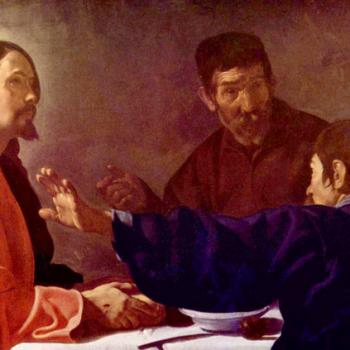One of the objections that I’ve heard to A Man Attested by God is what I will call the “catholic objection.” I’ve left the “c” lower case on purpose, because it has come from others besides those affiliating themselves with the Roman Catholic Church. It’s an objection based on what “the church” intended to say when it canonized the Synoptic Gospels alongside John and Hebrews and Colossians.
As the early church was figuring out which books were going to bed read in public worship one of the criteria was coherence with the teaching of the apostles. There was a basic theological unity that they understood to be at play in the various texts that came to be accepted as what we would call “canonical.” 
So, if the church that held these books together did so with the understanding that they spoke the same about God and Christ, and if this same church fought till it was red in tooth in claw for a divine Jesus who was also human, it is incoherent with the theological grammar of church and canon to read the Synoptic Gospels by bracketing divine Christology.
Perhaps put more simply: by making the decisions that would lead to the whole NT being bound together in one book, the church made the context of interpretation one in which we must always see divine Christology at play.
No Pristine Past
But it’s important to get one thing out of the way, first: there is no pristine past where the right decisions were made that determines the historical reality to which all subsequent generations must capitulate. The whole reason that biblical scholarship exists is because people started realizing in the 17th century that the church’s assumptions and dogmas were often poor guides to understanding the biblical texts and the world that created them.
More to the point for this whole issue of canon and interpretation, some of the very reasons that “the church” had for accepting various texts as canonical are false.
Had the early church known what we know now about the authorship of the Pastoral Epistles they would not have been included in the canon because they (or at least 2 out of 3) were not written by Paul. It is doubtful that Hebrews would have made it into the canon had it not attached itself to the Pauline school in some way or other. Similarly, the probably early-second-century document we call 2 Peter would not have been “canonized” had it been as widely known then as it is now that Peter did not write it.
The church’s decisions and reasoning cannot control the historical realities that gave rise to them. This is so for critical questions pertaining to authorship and it is so for critical questions pertaining to interpretation.
People who are part of “the church” can always protest and reiterate what the church has always said. Protestants cannot make such claims with any integrity (hence the vacuousness of so much of the “theological interpretation of scripture” movement). But even more generally speaking, it is better for our faith to acknowledge what’s there in history, even when it’s not what we know or wish for today. Then we can make the turn toward following Christ and participating in the church in faith, without the comforting crutch of “certainties” that may, in fact, be factually false.
Out of Control
It’s a truism that authors do not control the meaning of the texts they pen. For anyone reading the Bible (Orthodox, Roman Catholic, or Protestant) this is a double-edged sword.
For those who want to use the Tradition of the church as a hermeneutic to control biblical interpretation it is a benefit: what the actual authors of the text meant does not control what it means after the church has finished recontexutalizing it by means of both canon and creed.
But on the other hand, it also means that the new book the church created (when, exactly did it do this, by the way, since there was never any church-wide proclamation or council defining the extent of the canon?) is not subject to the interpretive control of “the author” at the time that the author wrote it.
In fact, the scripture is the unruly offspring of the Father who inseminated it and the church that birthed it. Like all children, scripture is not subject to the control of its parents, and sometimes chooses to honor them by finding its own way, that they would never choose, on its path to maturity.
Like any text, it is read differently by different people in different times and places. (How the contemporary reader manages to find so little divine sanction for slavery is a wonder to behold. We know that slavery is evil, and our readings of scripture show it.)
Like any child, it grows up as part of a tradition that it sometimes embraces, sometimes throws off, and sometimes transforms.












